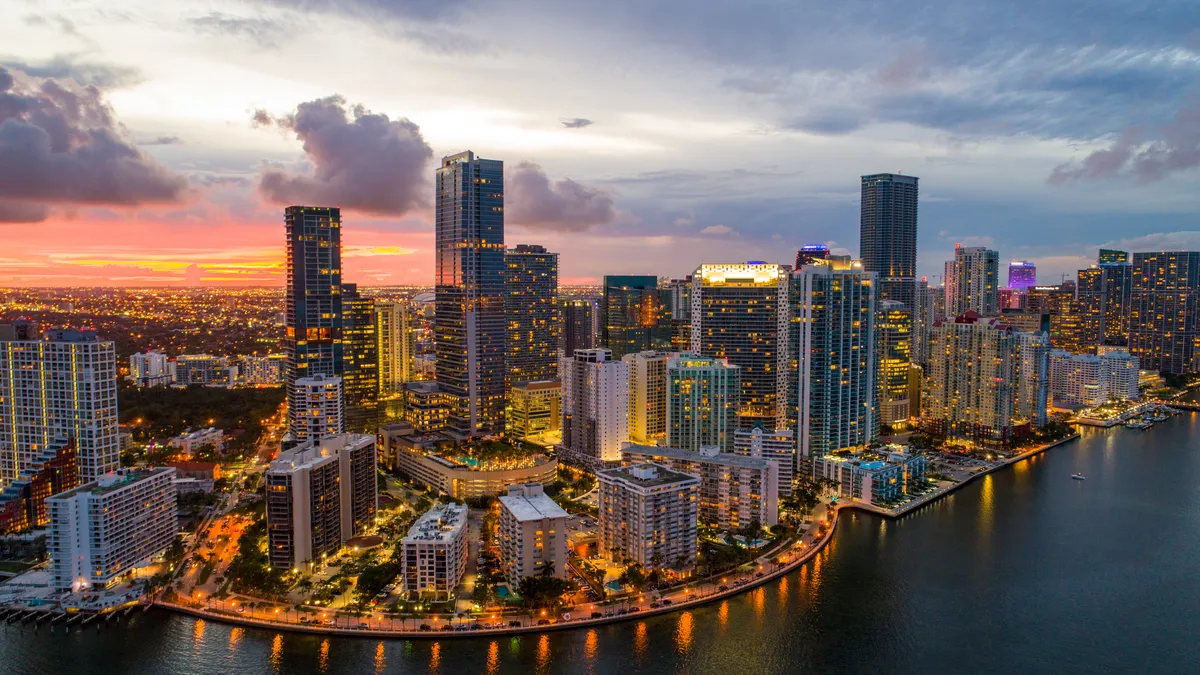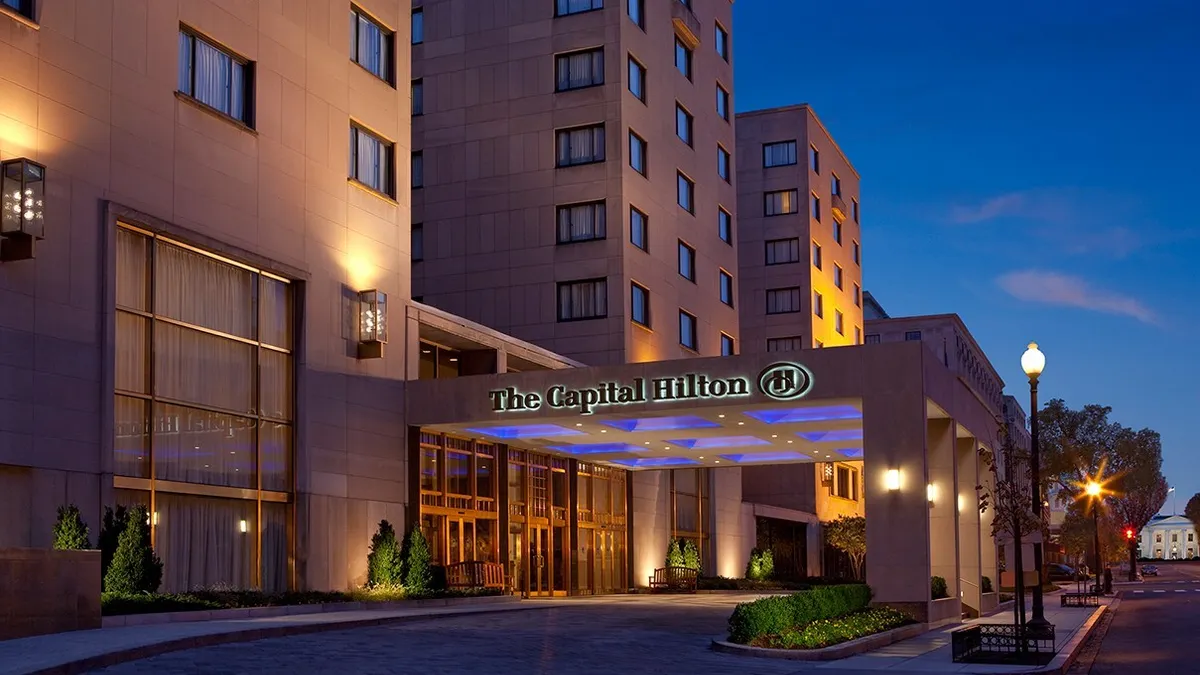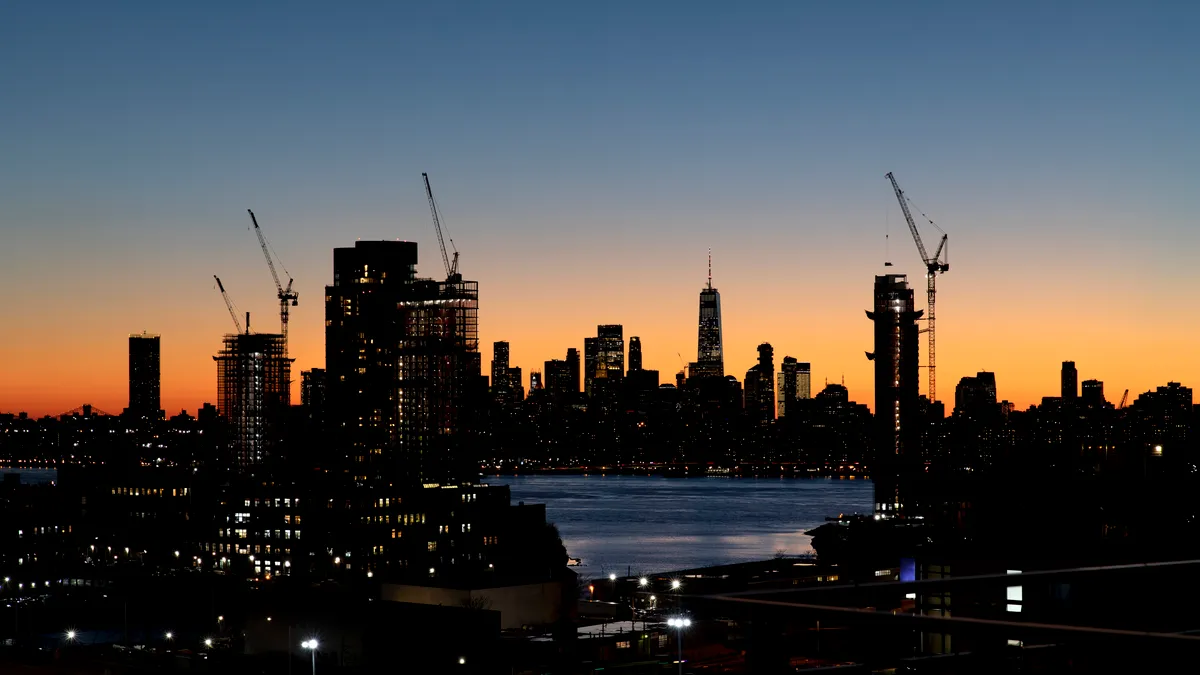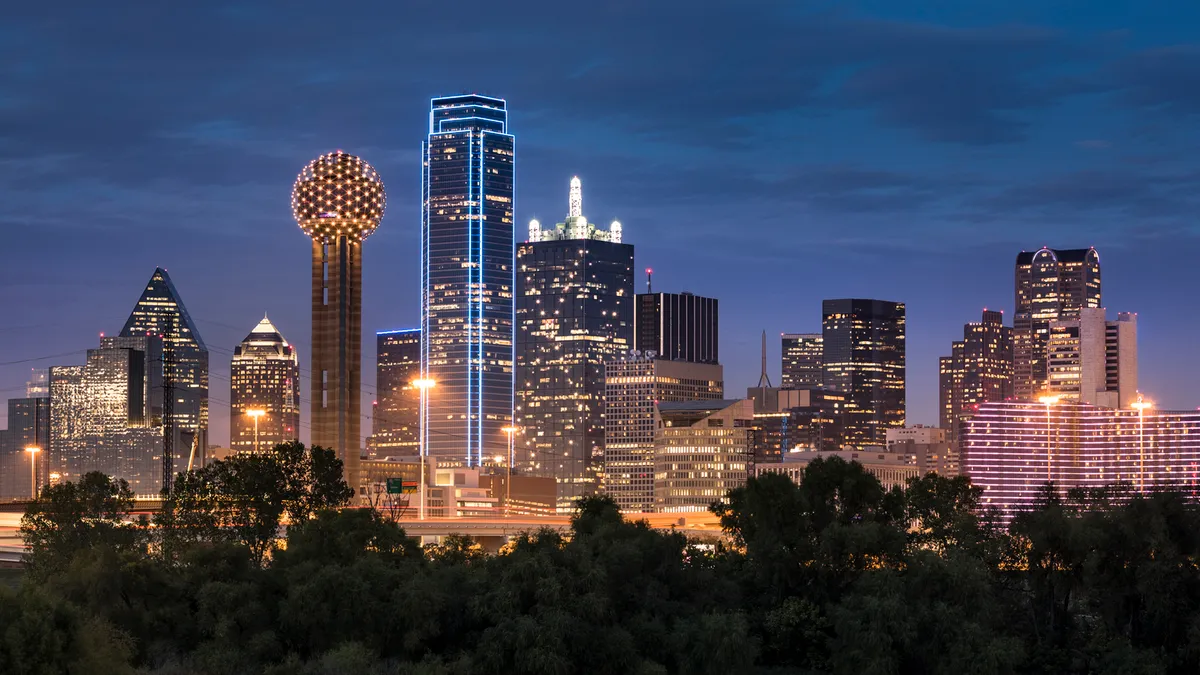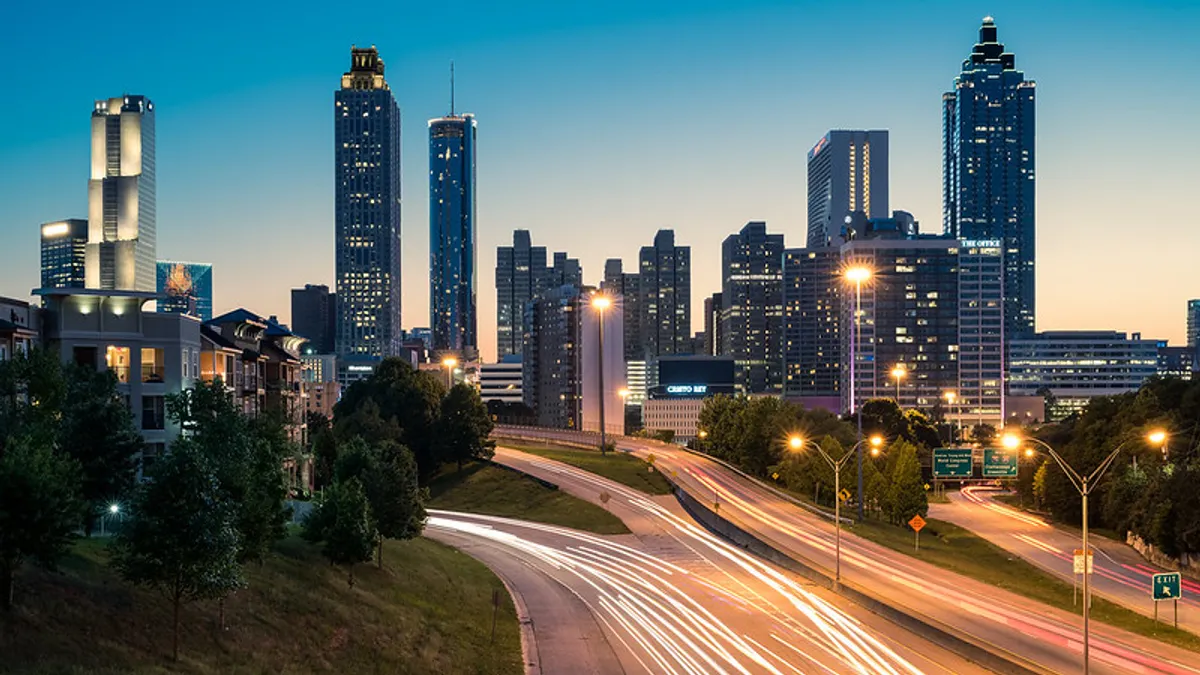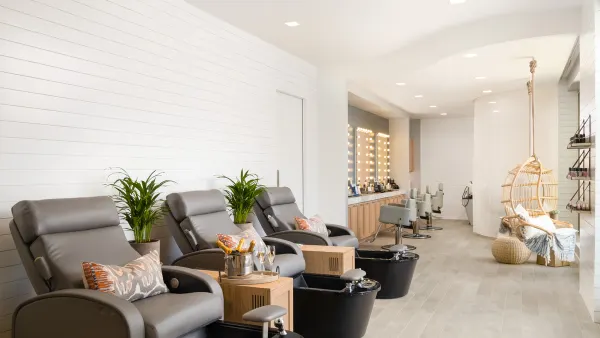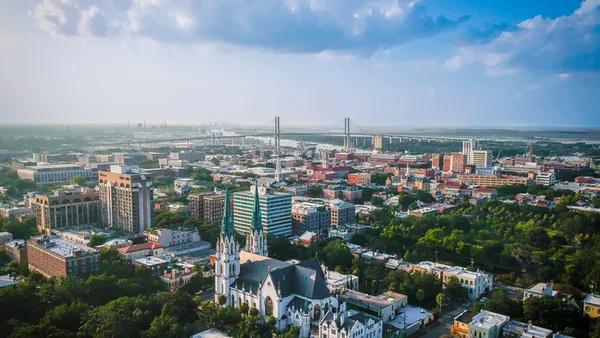Miami was a top market for hotel investors and developers to watch going into 2023, as its RevPAR at year-end 2022 far exceeded 2019 levels and travel demand persisted.
As the year has progressed, though, the market’s year-over-year declined RevPAR growth seemed to signal trouble in paradise.
But, as local hospitality experts shared with Hotel Dive, year-on-year metrics don’t paint the full picture of the market’s post-pandemic recovery. Rather, experts remain bullish on Miami’s success, especially as the city begins to see a resurgence of business travel and an uptick in luxury hotel projects.
The post-pandemic picture
For each quarter so far in 2023, Miami’s RevPAR has decreased year over year — down 1.3% in Q1, 15% in Q2 and 9.4% in Q3, according to CoStar data obtained by Hotel Dive. ADR growth had a similar trajectory this year, decreasing year over year in each of the same quarters.
Declined performance in Miami is likely due to stabilizing tourism rates, according to a mid-year 2023 report on the Miami-Dade County’s hospitality market by commercial real estate investment sales brokerage Marcus & Millichap.
Tourism to Miami boomed in the years directly following the pandemic due to the city’s relatively relaxed local health restrictions while many other destinations remained closed, the report detailed.
In 2021, 24.2 million visitors came to the Miami area, which “essentially matched the total volume of tourists seen in 2019,” according to a report by the Greater Miami Convention & Visitors Bureau.
A similar annual report by the bureau showed that tourism levels grew by 9.5% in 2022, with Miami seeing 26.5 million visitors. Tourism resulted in 17.1 million hotel room nights sold in 2022, an increase of 12.7% compared to 2021, according to the report.
But tourism levels began to flatten in 2023, exacerbated by a high local rate of inflation and changing traveler preferences, the Marcus & Millichap report detailed.
As tourism rates slowed in Miami this year, performance matched the decline. But Robert Hunter, SVP of investments and senior director of Marcus & Millichap’s Hospitality Division, told Hotel Dive that simply looking at the year-on-year metrics can give a skewed idea of the market’s growth.
Both RevPAR and ADR, for instance, remain significantly above pre-pandemic levels in the third quarter of this year compared to the same time in 2019, up 14% and 20%, respectively, according to CoStar data.
While declined year over year at Q3 2023, Miami’s RevPAR and ADR are still above 2019 levels
And even though leisure travel has lightened in the market since its post-pandemic boom, business travel is starting to have its moment in Miami — and it’s directly impacting hotels, Hunter, and his Marcus & Millichap colleague Leo Reilly, shared.
Booming business
Some neighborhoods of Miami, including Coral Gables and Coconut Grove, have seen a resurgence of business travel lately, according to Reilly, who said the office sectors in these submarkets are thriving.
“You have a lot of large companies announcing new offices. Like Virgin Hotels, for example, just announced that they're going to lease space for 500 employees in Coconut Grove, and then FIFA is going to be moving 100 employees to Coral Gables,” Reilly said.
When a city’s office market is doing well, he noted, that’s typically good news for hotels because people will travel to those headquarters — especially given how many employees work remotely and need to stay at hotels when they visit the office.
According to a mid-year 2023 report by Marcus & Millichap on Miami-Dade County’s office market, the metro area is seeing sustained demand by larger corporate firms. Companies making the move to Miami by the end of 2024 include Blue Legacy Ventures, Innovation Refunds and Fortress. Altogether, the companies will occupy a collective 158,000 square feet of office space, the report said.
“[Miami] continues to evolve as a major international city. The growth we’ve seen around the business and finance side of things has been very promising,” Alessandro Colantonio, chief investment officer at Miami-based real estate investment and development firm Gencom, told Hotel Dive. “As we look forward five, 10 years, we really see Miami as becoming, outside of New York, a real financial epicenter.
“As we look forward five, 10 years, we really see Miami as becoming, outside of New York, a real financial epicenter."

Alessandro Colantonio
Chief Investment Officer at Gencom
“We don’t see that slowing down,” he added. “Miami has a lot of room to run here in terms of growth.”
Travel to Miami for conferences and events is also ramping up, Reilly noted. This follows pace with other markets like New York City and Dallas, which have seen heightened group travel drive increased profits and revenues in the latter half of 2023.
Mixed-use majority
To accommodate heightened business travel to the market, several of the city’s major ongoing hotel developments are part of larger mixed-use projects, which often feature office, retail, residential and hotel space.
One of those projects, Reilly noted, is Miami Freedom Park, which broke ground in the summer.
The 58-acre mixed-use development will include public parks and green space, a tech hub, restaurants and shops, community soccer fields and a 25,000-seat stadium for the Inter Miami soccer team. There are also 750 hotel rooms planned, Reilly said.
Another mixed-use development set to “completely transform the area around it,” Reilly noted, is Gencom’s Miami Riverbridge project.
The development will bring roughly 190,000 square feet of meetings and events space, residential apartments, new public green space and a “reimagined” 615-room Hyatt Regency hotel to the market.
According to Gencom’s Colantonio, part of why this year was “the right time to get [Miami Riverbridge] off the ground,” is because of the “continued excitement, positive trends and a lot more demand on the business travel side for urban markets and urban hotels.”
Colantonio told Hotel Dive that the firm also plans to update its luxury Ritz-Carlton Key Biscayne asset to keep up with changing traveler demand, including luxury travelers wanting “bigger and better” amenities.
Miami is seeing an uptick in luxury development, according to Andrew Dickey, managing director with JLL’s Hotels & Hospitality investment sales team in Miami. The luxury segment is growing faster than any other in the market, he said, following an increase in luxury travel demand globally.
Some luxury hotels in the market, Dickey pointed out, include Faena Hotel Miami Beach, The Miami Beach Edition, 1 Hotel South Beach and Four Seasons Hotel at The Surf Club.
Many of the luxury hotel projects in the market are also mixed-use, and feature a residential component, Dickey noted, including the Waldorf Astoria Hotel and Residences, which is currently under construction in downtown Miami’s central business district.
The luxury project will claim the title of Miami’s tallest tower, rising 1,049 feet tall upon its completion in 2027. Shared amenities between the hotel and residences will include multiple dining concepts, meetings and events space, a spa and a fitness center with private training facilities.
A similar project underway in the market is the Mandarin Oriental hotel and branded residences in Brickell Key, set to replace the existing Mandarin Oriental, Miami hotel.
The two-tower luxury development will feature 151 hotel guest rooms and 220 residential units upon its completion in 2030. The towers will be connected by and share a 100,000-square-foot amenity podium, with multitiered infinity swimming pools, private cabanas, restaurants and bars, flexible meetings and events space and a spa.
Overall, Miami currently has 60 hotel projects, or 10,564 rooms, in the pipeline, Lodging Econometrics shared with Hotel Dive.
Investor interest
There’s also “a strong investor appetite for Miami,” Dickey said, noting that the market is seeing more high-net-worth buyers than in past cycles.
Marcus & Millichap’s Hunter agreed that “larger, well-funded” groups are the top buyers in the market currently because these investors have the ability to “absorb higher cost debt insurance to get premium assets in the market.”
Many hotel owners in the market, though, are holding onto their assets due to healthy RevPAR growth when compared to pre-pandemic levels, Dickey said.
Nonetheless, deals are still getting done.
Earlier this year, JLL’s Hotels & Hospitality Group completed the $835 million sale of the 1,000-room Diplomat Beach Resort in Hollywood, a northern suburb of the Miami metropolitan area. The firm also recently brokered the $53.5 million sale of SLS Brickell, a 124-room luxury and lifestyle hotel located in Miami’s Brickell neighborhood.
Earlier this month, an upscale Even hotel sold near the Miami International Airport. Investment activity has been strong in submarkets near the airport, including Doral and Blue Lagoon, Reilly noted.



